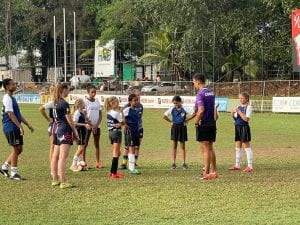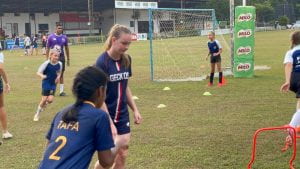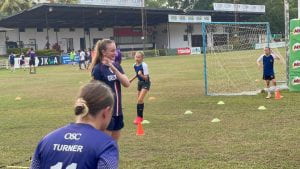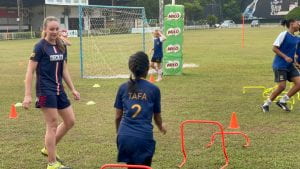LO2 Demonstrate that challenges have been undertaken, developing new skills in the process A new challenge may be an unfamiliar experience or an extension of an existing one. The newly acquired or developed skills may be shown through experiences that the student has not previously undertaken or through increased expertise in an established area.

This was my first official Term as a TAFA Coach! Before now, I had been helping TAFA as a student assistant, unofficially, by gathering balls, helping organize the kids into groups, collecting bibs, pumping balls, and many other things similar in manner, to help the coaches out. I was helping the younger kids, giving them tips and helping them improve their form, and I was playing as a player with the older girls. Unfortunately, there were not very many girls my age, as the age group had the majority of under 14 years old, and many girls even younger; as young as 8. This was a little challenging for me to play with, as it was a fine balance between trying my best and trying to go gentle on these young little girls (almost 10 years younger than me!). More recently, during my coaching job, many more older girls (around 14) from our school have joined TAFA, which intensely increased the skill level of the game. This was beneficial as it helped me improve my skills during the game, as a player, as well as challenging me to be a better coach – as the players were already in at a high skill level.
Previously during the year, my friends Emily, and then later on Sam were both asked to coach as interns at TAFA. I was helping them both, but I had never officially been asked to be a coach. Then, after a couple of months, I had been asked, and I began coaching as an intern! I was very excited to begin, and this whole first term of coaching has been a wonderful experience for me to learn, develop my skills as a coach, and see a whole new side of the game of football!
We wrote this short TAFA Article for their newsletter, and we wrote it for the 4 of us teenager interns – Emily, Sam, Ruben and I.
Interns Coaching Experience – Emily, Sam, Ruben, Chloe

Working at TAFA as intern coaches for the past two terms has been an enlightening experience, to say the least. As a group, we decided to intern at TAFA for many different reasons. Mainly, to improve our ability to work with students and gain knowledge from our coaches, who have been helping us along the way. They’ve handed us chances to assist and even run our own sessions, which were very helpful to use to learn new coaching skills. It was a very welcoming opportunity and has given us loads of new knowledge and skills on the game, as well as a new perspective, and a new way of interpreting the game. TAFA has also taught us a sense of commitment. Especially when it comes to attending the sessions every week and putting in our best efforts. As well as teaching us a sense of responsibility when it comes to running a session and looking out for the wellbeing of the students.
As we all know being hit with a pandemic isn’t what we had in mind for this TAFA season. The coaches had to face many challenges through teaching football online but the experience has taught us as interns how to overcome these challenges.
As a group of interns, it’s safe to say that we have had an incredibly enjoyable experience watching the students at TAFA grow and improve into extremely talented and hard-working footballers, who share the same passion for the sport as us. We look forward to the next term and to seeing these young athletes develop their skills further, and we are excited to grow our coaching skills with them.

Each session we were helping to coach in, there were 2 hours of training. On Monday, from 4-5 pm, I helped coach some beginner-level girls who had never played football before. I worked mainly with Coach Henry – the main girl’s coach, and he helped guide Emily and me through our coaching experience. I also worked with Aaron, another TAFA intern, who also helped guide me through the coaching process. Then, the same group of us coaches took the TAFA Senior girls group from 5-6 pm on both Monday and Wednesday. These girls are more experienced than the first group of girls, and I know many of them personally from going to my school. Additionally, during lots of these coaching sessions, Emily and I also had the lucky opportunity to play as goalkeeper, or outfield when we were playing miniature matches.
LO4 Show commitment to and perseverance in CAS experiences Students demonstrate regular involvement and active engagement in CAS.
I displayed regular engagement during CAS, by showing up to 3, 2-hour training sessions every week – on Monday, Wednesday and Saturday.
LO5 Demonstrate the skills and recognize the benefits of working collaboratively Students are able to identify, demonstrate and critically discuss the benefits and challenges of collaboration gained through CAS experiences.

Working with these 3 other coaches really helped me in my experience of coaching. Working collaboratively really helped me, because I could bounce ideas back and forth with Emily, and we both put our heads together to plan some of the sessions. Also, during the sessions we planned, it was so helpful to have Emily there with me, as we both did parts of the session, organized different parts, and took the lead alternately in explaining the different drills. This really helped me, as we worked together, and it was a really supportive environment that we were in. I also felt extra support from Coach Henry and Aaron when running these sessions, as they helped us with the logistical aspects, like leading the warmup, setting up cones and gathering the attention of the girls. For the majority of the sessions, Coaches Henry and Aaron run them, with me and Emily doing the logistical support. Working together really helped us, as there were many people to give advice to the girls, and help them improve their skills and technique. Lots of people also let some of us do setting up, and others doing the proper coaching. Some challenges that come with working collaboratively in coaching are communicating with the other coaches in terms of who is planning each session, and who is leading which activity. It was also challenging to pick activities when Emily and I had to run the session, as we both came up with such good ideas, and we wanted to do them all, but couldn’t due to the lack of time.

On Wednesday, from 4-5, I coached the Under 8s age group, with Emily, and Ruben as interns with me, and usually Coach Aaron ran the main session (although Coaches Eddie and Henry also did occasionally). The same benefits and challenges of working collaboratively also applied here too, and on my Saturday Training sessions (when we alternated coaches).
LO1 Identify own strengths and develop areas for growth Students are able to see themselves as individuals with various abilities and skills, of which some are more developed than others.
As a coach, I have many areas of strength, and other areas I need to continue to develop.
Strengths:
- Coming up with fun, engaging and new training drills and activities for the girls to do during trining
- Growing strength – being more assertive on the field, telling people where to go, and managing the behaviour of kids
- Explaining the drills well, with a verbal explanation, and a visual example
- Interacting with the girls, making them feel interested, encouraging the less motivated ones to try more and do their best
- Identifying areas of improvement for the players, and adapting my training sessions to fit the areas they need to improve
- Working well with my co-workers, and collaborating with them to make sessions
Areas to Further Develop:
- Being even more assertive than I have been being, talking louder and more enthusiastically, so everyone can hear me
- Explaining the drills in more detail, with a better example when the players are confused
- Being more confident in myself, the drills I pick, and my coaching abilities (sometimes I do not appear very confident in myself, which will not make the players confident in me as a coach)
- Stopping the game more often, to explain a scenario we have been working on, or to practice a specific part of the game, such as corner kicks, throw-ins, or goal kicks
- Developing a better technical knowledge of the game, and of the more complicated rules
- Developing better football ball-handling skills, to better demonstrate some activities

Here is a quick video I created to show a little bit about some of the early training sessions:
(Video Credits: Jason Grandbois, Editing: Me)
LO1 Identify own strengths and develop areas for growth Students are able to see themselves as individuals with various abilities and skills, of which some are more developed than others.
LO2 Demonstrate that challenges have been undertaken, developing new skills in the process A new challenge may be an unfamiliar experience or an extension of an existing one. The newly acquired or developed skills may be shown through experiences that the student has not previously undertaken or through increased expertise in an established area.
LO4 Show commitment to and perseverance in CAS experiences Students demonstrate regular involvement and active engagement in CAS.
LO5 Demonstrate the skills and recognize the benefits of working collaboratively Students are able to identify, demonstrate and critically discuss the benefits and challenges of collaboration gained through CAS experiences.